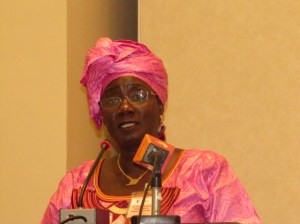Interview of the Month
 In 2005, she was among the 1000 women proposed for the 2005 Nobel Peace Prize.. She was nominated in February 2011 for the Gender Award (The Gender Award is awarded to personalities who have distinguished themselves in promoting gender equality and women’s rights in Africa). In 2007, she was awarded for the Minerva Award of Merit by the Italian Association “It Club delle Donne (Women’s Club). "This award is given to women who make a difference through their work in the field and who are role models in their professional skill." She believes that "Sustainable peace cannot be established without the participation of women and girls."
In 2005, she was among the 1000 women proposed for the 2005 Nobel Peace Prize.. She was nominated in February 2011 for the Gender Award (The Gender Award is awarded to personalities who have distinguished themselves in promoting gender equality and women’s rights in Africa). In 2007, she was awarded for the Minerva Award of Merit by the Italian Association “It Club delle Donne (Women’s Club). "This award is given to women who make a difference through their work in the field and who are role models in their professional skill." She believes that "Sustainable peace cannot be established without the participation of women and girls."
MEWC: What are the most pressing issues for women in Africa?
African women face several problems but the main thing is the discrimination that occurs in many forms and which originate in the cultural and social pressures in many African countries. There is illiteracy, which is persistent in some countries, poverty, and violence of all kind. The problem of women's empowerment is a big concern. It is important to empower free women and reinforce their power over their own actions.
MEWC: The AU launched the AWD in October 2010, an entire decade dedicated to women and girls in Africa. What are your impressions and what changes could this decade bring to women and girls in Africa?
The African Decade for Women is an expressed desire to realize the full commitment of our States to promote the rwomen's and girls rights in Africa. These commitments should be translated into actions and the ratified through conventions. Women must seize this opportunity to set the agenda to claim and propose adequate solutions so that women and girls can enjoy their rights. Women's organizations should be vigilant about the implementation of the programs, especially about the resources intended for these programs. The African Union should establish a mechanism for monitoring and evaluating progress in implementing the African Women's Decade. The issue of resources is more important in the success of the African Women's Decade. There are already a lot of skills and mechanisms that work to empower women and girls in Africa.
MEWC: What are the challenges women and girls face in Africa?
The issue of gender mainstreaming in macroeconomic policies and programs are not effective in all countries.
There is a consistent problem of lack of funding for education especially in the fields of science and technology. Microfinance can not meet these challenges. Access to leadership and decision making positions, as well as participation in political life are limited for women The feminization of the poverty, of HIV/AIDS are increasingly afflicting women. Food security is another problem. These are all obstacles that women and girls face in Africa.
MEWC: Do you think there is enough will from African governments to push a/the gender agenda in Africa?
Some, such as Senegal, Rwanda, South Africa etc., expressed through their political decisions their will to address the real problems women and girls face. But others have not even ratified the Maputo Protocol on Gender let alone implement it. We must redouble our efforts and our advocacy to realise this. The willingness without action is useless!
MEWC: The President Amadou Toumany Toure has recently appointed a woman as head of the Malian Government, can you tell me what are your thoughts on this historic appointment?
We are delighted for this landmark appointment. This comes as a victory for our struggle for the acces of women at decisions-making and leadership positions.
However, we expect further appointments becuase everything is not just in the Government, there are other positions that need to be promoted as well by the President, the Prime minister and other Ministers and heads of services, heads of parties.
The battle is won but the war is not over yet!!!. The prime minister ccomes at a difficult moment in the political and social life and she will have many challenges. Therefore, I urge all women, men to support her because her succes will be the victory of all of us.
MEWC: What is your message to African women during this landmark decade?
The strongest message for my African sisters will be to work together in solidarity to advance the decision. It is necessary to reinforce our spaces and to work with men, decision makers, governments institutions and civil society to be able to influence the implementation of our programs. It is necessary to take care of the various programs of our States and our technical and financial partners.
To read our last month interview, please click here
